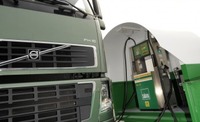Volvo Logistics test drives with rapeseed oil
 Environmentally-adapted fuel is one step on the road to reducing carbon emissions at Volvo Logistics. The first petrol station in western Sweden selling ACP Diesel Bio30 is now opening at the Skandiahamnen port in Gothenburg, close to Volvo’s plants and its trans-shipment terminal in Arendal. This is the result of a joint venture between IKEA, H&M, DHL, Preem and Volvo Logistics.
Environmentally-adapted fuel is one step on the road to reducing carbon emissions at Volvo Logistics. The first petrol station in western Sweden selling ACP Diesel Bio30 is now opening at the Skandiahamnen port in Gothenburg, close to Volvo’s plants and its trans-shipment terminal in Arendal. This is the result of a joint venture between IKEA, H&M, DHL, Preem and Volvo Logistics.“If large, transport-intensive companies like us collaborate, we can produce a far greater effect. I think we are going to see more partnerships like this in the future,” says Ake Niklasson, President of Volvo Logistics.
Volvo Logistics has been challenged by its customers in the Volvo Group and Volvo Car Corporation to reduce the carbon content of transport to their plants by 20 per cent by 2010. The use of environmentally-adapted fuel is one of many ways of realising this target. Diesel Bio30 contains 30 per cent of the renewable fuel RME (rape methyl ester).
“This inauguration is an important step towards this objective, as far as we are concerned,” says Susanna Hambeson, Environmental Manager at Volvo Logistics. “Even if we are in the midst of a recession, we have to keep working for the things we regard as important. Volvo’s corporate values of quality, environmental care and safety are always important.”
Viking Rail, an intermodal solution that combines trucks and trains, is another example of a joint-venture project designed to reduce carbon emissions. A daily goods train between Hannover in Germany and Gothenburg, Sweden is filled with components for the automotive industry on the journey northwards and with other goods returning south. The goods are transported to and from the rail terminals by truck.
Volvo Logistics is also a member of the Climate-neutral Freight Transportation (KNEG) joint project, together with the Swedish Road Administration, Chalmers University of Technology, Green Cargo and a large number of Swedish companies with environmental ambitions.
Renewable fuels have the potential to reduce carbon emissions, but they all have their advantages and disadvantages.

